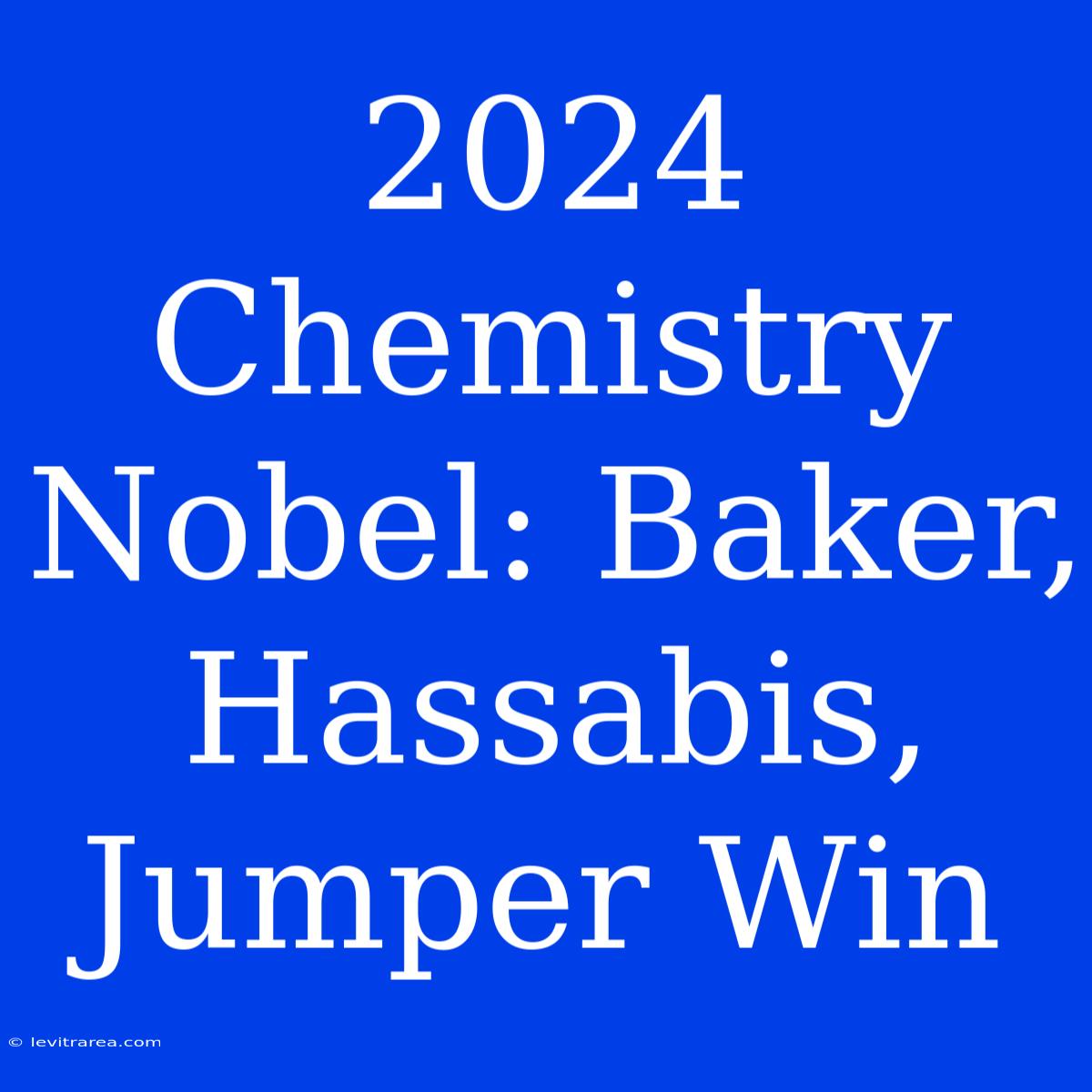2024 Chemistry Nobel: Baker, Hassabis, Jumper Win for Revolutionizing Protein Design
The 2024 Nobel Prize in Chemistry has been awarded to David Baker, Demis Hassabis, and John Jumper for their pioneering work in revolutionizing protein design using artificial intelligence. This prestigious award recognizes their groundbreaking contributions to understanding and manipulating the intricate world of proteins, paving the way for transformative advancements in medicine, materials science, and beyond.
Unraveling the Secrets of Proteins: A Journey from Nature to AI
Proteins are the workhorses of life, responsible for everything from catalyzing chemical reactions to building and maintaining cells. Their complex three-dimensional structures, which dictate their function, have fascinated scientists for decades. However, predicting these structures from a protein's amino acid sequence remained a significant challenge. This is where the brilliance of Baker, Hassabis, and Jumper comes into play.
David Baker, a renowned biochemist and professor at the University of Washington, spearheaded the development of computational methods for protein design. He envisioned a world where scientists could engineer proteins with tailor-made properties, revolutionizing drug discovery and material science. His lab developed Rosetta, a powerful software suite that uses algorithms to predict and design protein structures.
Demis Hassabis, a neuroscientist and co-founder of Google DeepMind, brought a revolutionary approach to protein design. Recognizing the immense power of artificial intelligence, he directed his team to develop AlphaFold, a deep-learning algorithm that accurately predicted protein structures with unprecedented accuracy. AlphaFold's breakthrough in 2020 stunned the scientific community, opening new avenues for protein research.
John Jumper, a computational biologist and key figure in the AlphaFold project, played a crucial role in developing the algorithm's architecture and training strategies. His expertise in machine learning enabled AlphaFold to analyze vast amounts of protein sequence and structure data, making it a formidable tool for protein design.
Beyond Prediction: The Dawn of Engineered Proteins
The impact of Baker, Hassabis, and Jumper's work extends far beyond predicting protein structures. Their breakthroughs have ushered in an era of de novo protein design, where scientists can create entirely new proteins with desired properties. This opens exciting possibilities for:
- Drug Discovery: Designing proteins that specifically target disease-causing molecules, leading to more effective and targeted therapies.
- Materials Science: Creating proteins with unique mechanical or chemical properties, for applications ranging from biodegradable plastics to novel catalysts.
- Food Science: Engineering proteins with improved nutritional value or novel functionalities, addressing global food security challenges.
A Glimpse into the Future: Protein Design Reimagines the World
The award to Baker, Hassabis, and Jumper signifies the transformative power of AI in scientific discovery. It highlights how these technologies can unlock the secrets of nature, empowering us to engineer solutions to some of humanity's greatest challenges.
The field of protein design is just beginning to blossom. As scientists delve deeper into the intricate world of proteins, we can anticipate even more groundbreaking discoveries and innovative applications. The future of medicine, materials science, and beyond is bright, thanks to the visionary work of these Nobel laureates.
FAQs
Q: How does AlphaFold work?
A: AlphaFold is a deep-learning algorithm trained on massive datasets of protein sequences and structures. It uses a complex neural network to predict the three-dimensional structure of a protein from its amino acid sequence.
Q: What are some potential applications of de novo protein design?
A: De novo protein design has applications in various fields, including drug discovery, materials science, food science, and environmental remediation. For instance, engineered proteins can be used to create biodegradable plastics, develop novel catalysts, or enhance the nutritional value of food.
Q: What are the ethical implications of AI-driven protein design?
A: The ethical implications of AI-driven protein design are complex and require careful consideration. For instance, the potential for creating bioweapons or other harmful substances must be addressed, and appropriate regulations and guidelines need to be established to ensure responsible use of this technology.
Q: What are some of the challenges facing the field of protein design?
A: Despite its impressive progress, the field of protein design still faces challenges. One major challenge is the complexity of protein folding, which can be influenced by a multitude of factors. Another challenge is the need for accurate experimental validation of designed proteins.
Q: How can researchers improve the accuracy and efficiency of AI-driven protein design?
A: Research efforts are ongoing to improve the accuracy and efficiency of AI-driven protein design. This includes developing more sophisticated algorithms, training them on larger datasets, and incorporating information from experimental data.
Conclusion:
The 2024 Chemistry Nobel Prize recognizes the transformative potential of AI in the field of protein design. This award highlights the pioneering work of Baker, Hassabis, and Jumper, who have opened new frontiers for scientific exploration and innovation. By harnessing the power of AI, we are poised to unlock the mysteries of proteins, leading to unprecedented advances in medicine, materials science, and beyond. As we continue to explore the vast potential of this technology, we must also remain mindful of its ethical implications and strive for responsible innovation. The future of protein design is bright, and the possibilities are endless.

